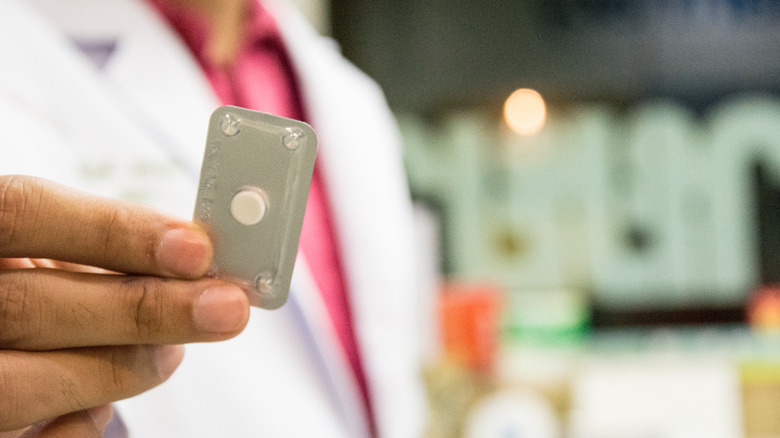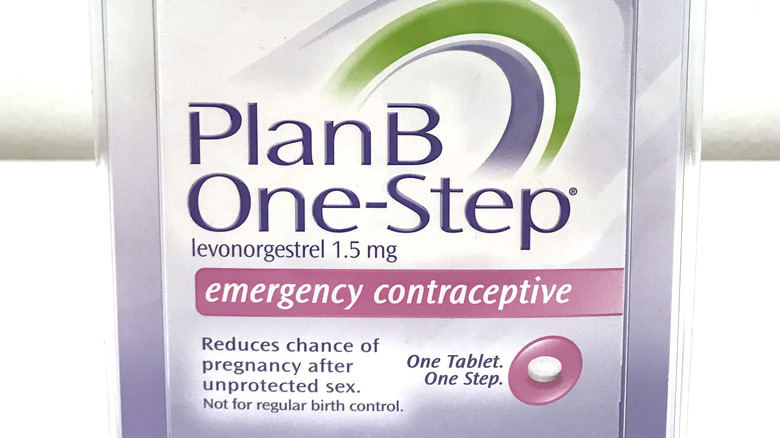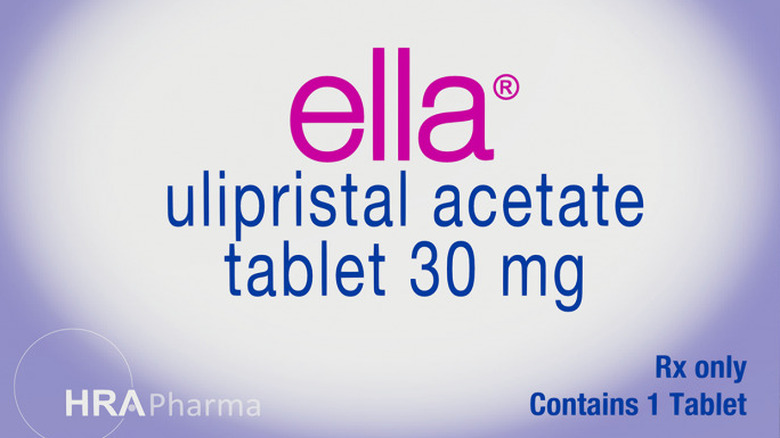Here's How Effective Morning-After Pills Are Depending On Your Weight
For many Americans, the options for addressing an unwanted pregnancy are more limited than ever. After the Supreme Court's decision to overturn Roe v. Wade, abortion is either illegal or soon expected to be in 26 states, according to CNN and the Guttmacher Institute. And while some major companies have taken a stand against the Roe v. Wade decision by promising to reimburse employees for the cost of traveling to get an abortion, not everyone can expect that corporate support. That's why for many who have had unprotected sex and want to avoid pregnancy, emergency contraception is the option they seek.
Versions of emergency contraception — also called the "morning-after pill" — are available both with or without a prescription depending on the type. Emergency contraceptive pills like Plan B, Aftera, and Take Action prevent pregnancy and are available without a prescription. They are not abortion pills. Morning-after pills like these "won't have an impact on an existing pregnancy," chief medical officer of Planned Parenthood Dr. Meera Shah told USA Today. Taking an emergency contraceptive soon after having unprotected sex — at least within 72 hours, according to the Mayo Clinic – stops that pregnancy from happening. What is lesser known about the morning-after pill, however, is that weight can impact its effectiveness.
Some morning-after pills are less effective for those 155 pounds or more
Given the uncertainty in the immediate aftermath of Roe v. Wade's roll back, it's important to know what options are still available — and effective — for those seeking to avoid pregnancy. If you find yourself in a situation where the morning-after pill is needed, you may not know that weight is a factor when considering impact.
If you weigh more than 155 pounds or have a BMI of 30 or higher, some emergency contraceptives may not work as intended. Researchers have found that popular morning-after pills that contain levonorgestrel — like Plan B, Take Action, and Aftera — are not as effective depending on the aforementioned factors, according to Healthline. Planned Parenthood additionally noted that Plan B and other levonorgestrel-based morning-after pills aren't as effective for those 165 pounds or more. These findings impact millions of women in the United States, where the average weight for women is about 170 pounds, according to research from the National Center For Health Statistics.
"This is a classic case of 'You're still a guinea pig when the drug is already out on the market,'" Anne Rochon Ford, executive director of Canadian Women's Health Network, told researchers in 2014 about clinical trials that did not see weight as a significant factor. "Who were they studying it on in the clinical trials? It just raises so many red flags about how clinical trials are done."
What morning-after pill to use if you're of average weight
Luckily, another emergency contraceptive is available on the market that is effective for women who weigh more than 155 pounds (i.e., most women in the United States). The morning-after pill Ella contains ulipristal acetate, making it the most effective emergency contraceptive, according to Planned Parenthood. The pill works up to five days after unprotected sex, though the sooner you take, the more effective it will be. Plan B and levonorgestrel morning-after pills are effective three days after unprotected sex, according to researchers. However, unlike levonorgestrel emergency contraceptives, Ella requires a prescription from a doctor or nurse.
Once you have an Ella prescription, it's possible to get up to a year's worth of refills depending on your healthcare provider, according to Verywell Health. But remember, Ella and other morning-after pills should not be taken like regular birth control pills.
If you weigh more than 195 pounds — the weight Planned Parenthood noted as a turning point in Ella's effectiveness — non-hormonal copper IUDs (intrauterine devices) are the best method of preventing pregnancy after unprotected sex. If you find yourself further along in the process, exploring the option of abortion pills — the access to which is up in the air depending on the state you're in, as of publication — could be another choice.


